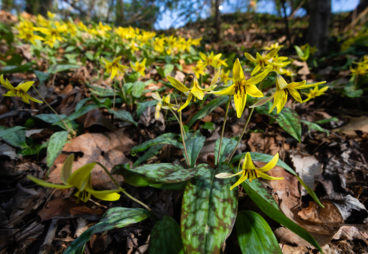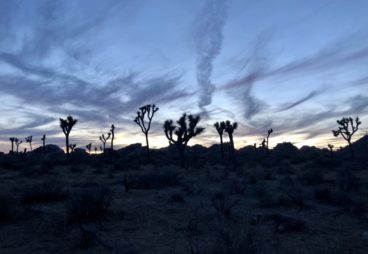

Community Science
Learning and contributing to science in the outdoors is another way you can help AMC's mission.
Engaging hikers in hands-on science and monitoring can make a big impression in their learning and for the projects they participate in. Through activities along trails throughout the region and at AMC high huts, AMC provides opportunities to learn about plant flowering times and relationship to climate, snow distribution in mountains, light pollution at night, and mercury pollution in dragonflies. Join us on your next hike by learning, observing, and recording.
Photograph Flowers and Fruit on your Hike with iNaturalist
our team of researchers count on the contributions of community scientists like you to better understand plant flowering and fruiting times across the region. This data is collected in the iNaturalist app, which empowers nature lovers to make observations and share them with research scientists. Here's how to get started:
- Download the iNaturalist app and create your account: You can search “iNaturalist” in both the Apple and Android App on Google Play stores.
- Turn on location services on your mobile device: This ensures that your photos are dated and geo-tagged for scientists when you upload a photo to the iNaturalist app.
- Take photos of flowers: Take a photo of the whole plant if possible and a close-up of flowers or fruit. You should take photos while in the iNaturalist app, but any photo you have captured with your phone’s camera can be uploaded later.
- Join AMC’s iNaturalist projects: AMC is involved in six iNaturalist projects. Some cover massive areas, like the entire Appalachian Trail corridor. Others are as small as a single state park. When you join a project, your observation is seen by AMC’s researchers, and you can get updates on the project through iNaturalist journal posts. Be sure to select “allow researchers to see coordinates” when you join! AMC’s projects are: Flowers and Fauna along the Appalachian Trail Corridor, AMC Maine Woods, Northeast Alpine Flower Watch, Flowers and Fauna of the White Mountains National Forest, New England Trail Nature Watch, Flowers and Fauna in Harriman State Park, NY.
The Dragonfly Mercury Project
The Dragonfly Mercury Project (DMP) is a national-scale monitoring, research, education, and public engagement initiative. The project is currently managed by the National Park Service and U.S. Geological Survey, with collaborative engagement from the Appalachian Mountain Club and Dartmouth College. Over the past 10 years, we have assessed mercury concentrations in dragonfly larvae in more than 500 water bodies across more than 140 U.S. national parks and other federal, state, and local protected areas, and engaged more than 6,000 public participants. Implemented under a community science framework, the Dragonfly Mercury Project enlists community scientists who work with National Park staff to collect dragonfly samples in the nation’s lakes, ponds, streams, rivers, and wetlands. AMC supports the national effort and is working to engage youth across the AMC region in this program.
In 2021, AMC launched the Merrimack-DMP program. Teachers and community partners are engaging youth and community members in sampling dragonfly larvae to determine relative risk around the lower Merrimack River watershed. This river and its tributaries have had a legacy of pollution, dating back to early industrialization. Lowell and Lawrence, environmental justice communities, are the focus of this work. Their results documented locations within the watershed with varying potential mercury risk; explore the project storymap to learn more.
Community Snow Observations
AMC is joining the Community Snow Observations project to improve observational data of snow depth in Northeast mountains. Northeast snow is disappearing too soon every spring, but how does that vary from open fields to forested trails? With the help of community scientists, we are collecting data to document trail-side snow depth and improve our understanding of snow across mountain landscapes. Learn more on how to get started here.
Globe at Night
What does your starscape look like? You can participate in Globe at Night wherever you are and measure and submit night sky brightness observation. Learn about the importance of dark skies and ways we can reduce light pollution. Visit AMC’s Maine Woods and nearby Katahdin Woods and Waters National Monument (U.S.), which was designated an International Dark Sky Sanctuary in 2020, and compare Globe at Night observations there to other locations.
Learn more about community science
Help Track Flowers and Fauna Along the Appalachian Trail with iNaturalist
The Appalachian Trail (AT) spans over 2,000 miles from Georgia to Maine. The landscape along its sides, known as the AT corridor, includes both the remote peaks and valleys...
ExplorePreserving the Dark Skies of the Maine Woods
AMC’s Maine Woods holds a unique role in the preservation of night sky—nestled within a more secluded part of northern Maine, it’s in the heart of one of few remaining...
ExploreThe Dragonfly Mercury Project at Joshua Tree National Park
It is adventures like these that remind us why we love to do the work that we do. At the beginning of March, the Dragonfly Mercury Project(DMP) core team...
Explore

